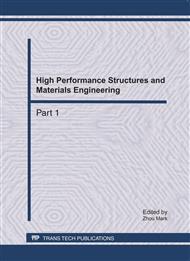[1]
Ying Luo, YangQuan Chen, and YouGuo Pi: Authentic simulation studies of periodic adaptive learning compensation of cogging effect in PMSM position servo system. Proceeding of the Chinese Conference on Decision and Control, Yantai, Shandong, China, pp.4760-4765, (2008).
DOI: 10.1109/ccdc.2008.4598233
Google Scholar
[2]
Bin Zhang, Danwei Wang, Yongqiang Ye: Stability and robustness analysis of cyclic pseudo-downsampled iterative learning control. International journal of control, Vol. 83(3), pp.651-659, (2010).
DOI: 10.1080/00207170903373753
Google Scholar
[3]
Freeman C T, Lewin P L: Rogers E, et al. Iterative learning control applied to a gantry robot and conveyor system. Transactions of the Institute of Measurement & Control, Vol. 32(3), pp.251-264, (2010).
DOI: 10.1177/0142331209104155
Google Scholar
[4]
Visioli Antonio, Ziliani Giacomo, Legnani Giovanni: Iterative Learning Hybrid Force/Velocity Control for Contour Tracking. IEEE Transactions on Robotics, Vol. 26(2), pp.388-393, (2010).
DOI: 10.1109/tro.2010.2041265
Google Scholar
[5]
Liu Tao, Gao Furong: Robust two-dimensional iterative learning control for batch processes with state delay and time-varying uncertainties. Chemical Engineering Science, Vol. 65(23), pp.6134-6144, (2010).
DOI: 10.1016/j.ces.2010.08.031
Google Scholar
[6]
Bing Chu, Owens, David H: Iterative learning control for constrained linear systems. International Journal of Control, Vol. 83(7), pp.1397-1413, (2010).
DOI: 10.1080/00207171003758752
Google Scholar
[7]
Jia Zhenyuan, Lu Xiaohong, Yang Jiangyuan: Self-learning fuzzy control of scan tracking measurement in copying manufacture. Transactions of the Institute of Measurement & Control, Vol. 32(3), pp.307-318, (2010).
DOI: 10.1177/0142331209342907
Google Scholar
[8]
Feipeng Da: Fuzzy neural network sliding mode control for long delay time systems based on fuzzy prediction. Neural Computing & Applications, Vol. 17(5/6) , pp.531-539, (2008).
DOI: 10.1007/s00521-007-0130-x
Google Scholar
[9]
Yordanova S: Robust performance design of singleinput fuzzy control system for plant with time delay. Transactions of the Institute of Measurement & Control, Vol. 31(5), pp.381-399, (2009).
DOI: 10.1177/0142331208095563
Google Scholar
[10]
Precup R E, Preitl S, Tar J K: Fuzzy Control System Performance Enhancement by Iterative Learning Control. IEEE Transactions on Industrial Electronics, Vol. 55(9), pp.3461-3475, (2008).
DOI: 10.1109/tie.2008.925322
Google Scholar


